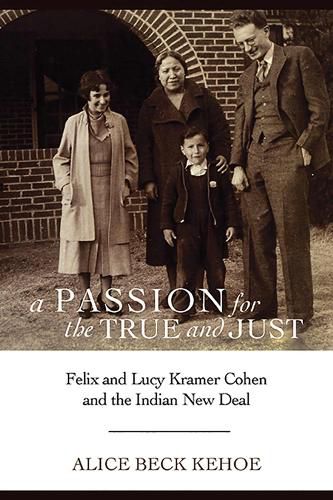Readings Newsletter
Become a Readings Member to make your shopping experience even easier.
Sign in or sign up for free!
You’re not far away from qualifying for FREE standard shipping within Australia
You’ve qualified for FREE standard shipping within Australia
The cart is loading…






Felix Cohen, the lawyer and scholar who wrote the Handbook of Federal Indian Law (1942), was enormously influential in American Indian policy making. Yet histories of the Indian New Deal, a 1934 program of Franklin D. Roosevelt’s New Deal, neglect Cohen and focus on John Collier, commissioner of Indian affairs within the Department of the Interior (DOI). Alice Beck Kehoe examines why Cohen, who as DOI assistant solicitor wrote the legislation for the Indian Reorganization Act (1934) and Indian Claims Commission Act (1946), has received less attention. Even more neglected was the contribution Cohen’s wife, Lucy Kramer Cohen, an anthropologist trained by Franz Boas, made to the process.
Kehoe argues that, due to anti-Semitism in 1930s America, Cohen could not speak for his legislation before Congress, and that Collier, an upper-class WASP, became the spokesman as well as the administrator. According to the author, historians of the Indian New Deal have not given due weight to Cohen’s work, nor have they recognized its foundation in his liberal secular Jewish culture. Both Felix and Lucy Cohen shared a belief in the moral duty of mitzvah, creating a commitment to the
true and the just
that was rooted in their Jewish intellectual and moral heritage, and their Social Democrat principles.
A Passion for the True and Just takes a fresh look at the Indian New Deal and the radical reversal of US Indian policies it caused, moving from ethnocide to retention of Indian homelands. Shifting attention to the Jewish tradition of moral obligation that served as a foundation for Felix and Lucy Kramer Cohen (and her professor Franz Boas), the book discusses Cohen’s landmark contributions to the principle of sovereignty that so significantly influenced American legal philosophy.
$9.00 standard shipping within Australia
FREE standard shipping within Australia for orders over $100.00
Express & International shipping calculated at checkout
Felix Cohen, the lawyer and scholar who wrote the Handbook of Federal Indian Law (1942), was enormously influential in American Indian policy making. Yet histories of the Indian New Deal, a 1934 program of Franklin D. Roosevelt’s New Deal, neglect Cohen and focus on John Collier, commissioner of Indian affairs within the Department of the Interior (DOI). Alice Beck Kehoe examines why Cohen, who as DOI assistant solicitor wrote the legislation for the Indian Reorganization Act (1934) and Indian Claims Commission Act (1946), has received less attention. Even more neglected was the contribution Cohen’s wife, Lucy Kramer Cohen, an anthropologist trained by Franz Boas, made to the process.
Kehoe argues that, due to anti-Semitism in 1930s America, Cohen could not speak for his legislation before Congress, and that Collier, an upper-class WASP, became the spokesman as well as the administrator. According to the author, historians of the Indian New Deal have not given due weight to Cohen’s work, nor have they recognized its foundation in his liberal secular Jewish culture. Both Felix and Lucy Cohen shared a belief in the moral duty of mitzvah, creating a commitment to the
true and the just
that was rooted in their Jewish intellectual and moral heritage, and their Social Democrat principles.
A Passion for the True and Just takes a fresh look at the Indian New Deal and the radical reversal of US Indian policies it caused, moving from ethnocide to retention of Indian homelands. Shifting attention to the Jewish tradition of moral obligation that served as a foundation for Felix and Lucy Kramer Cohen (and her professor Franz Boas), the book discusses Cohen’s landmark contributions to the principle of sovereignty that so significantly influenced American legal philosophy.